- Grades 6-12
- School Leaders
Don't Forget to Enter Today's Very Merry Giveaway!🎁
Every product is independently selected by our team of teacher-reviewers and editors. Things you buy through our links may earn us a commission.

75+ Best Science Fair Ideas for 7th Grade
Inspire your students to explore biology, chemistry, and more.
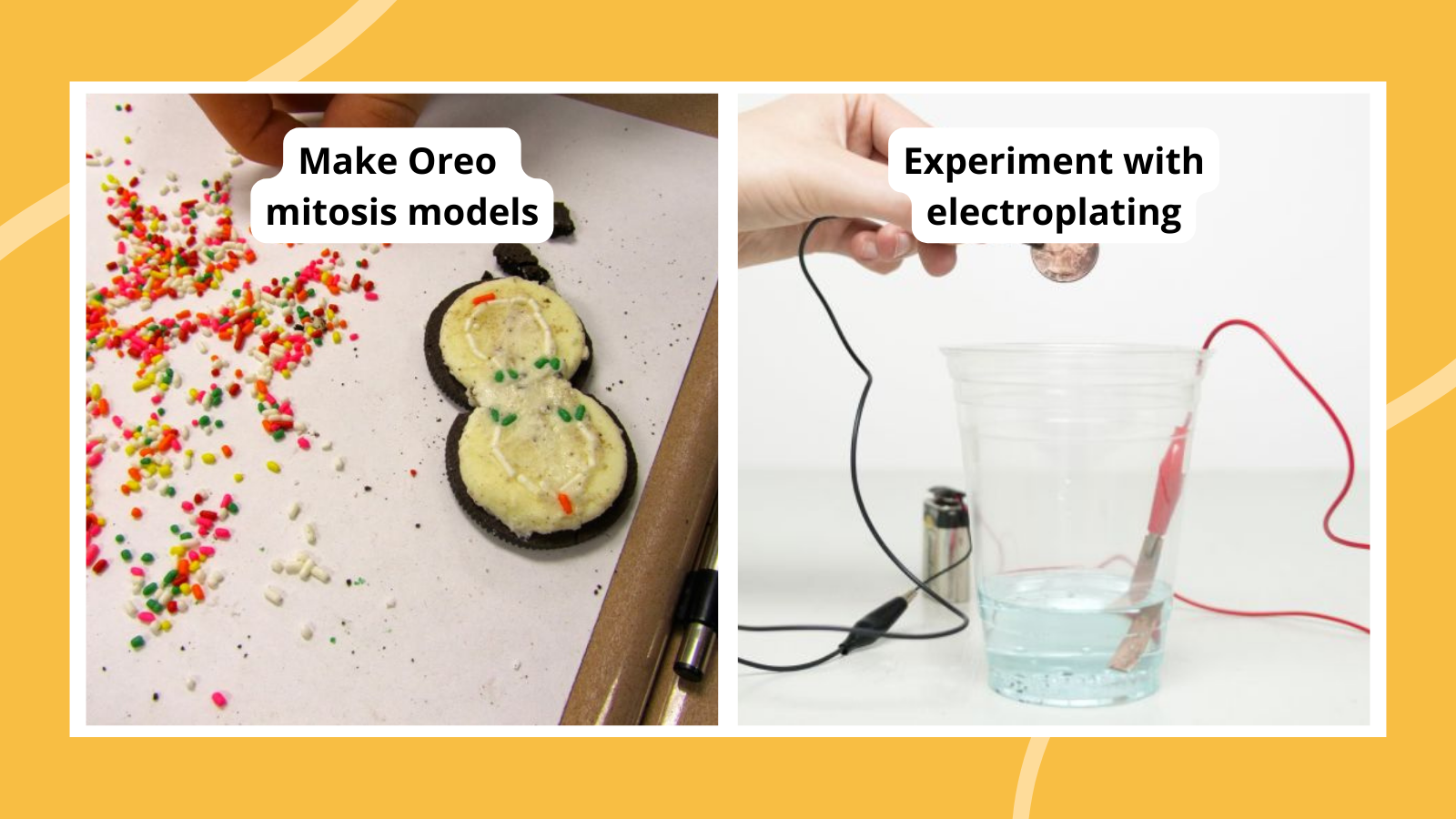
It’s science fair time! You can use science fairs to engage students in completing a formal experiment from hypothesis to conclusion, or you can use the opportunity for students to create, demonstrate, and explain a science concept or phenomenon. Whatever your approach, we have the best science fair ideas for 7th grade. Use this list for science fair ideas for biology and environmental science, chemistry, physics, or engineering.
We’ve organized the science fair ideas to help students figure out which project is right for them.
Level of difficulty:
- Easy: Allows students to engage in a topic that is familiar and that they may have studied in previous grades
- Medium: Requires students to do additional research or learn about a topic that can be difficult
- Advanced: Requires a deep understanding of a complex topic
- Basic: Materials can be found around the house
- Medium: Some materials will have to be purchased
- Advanced: Student may have to find materials in the science lab or specialty stores
Best Biology and Environmental Science Fair Ideas for 7th Grade
These projects are ideal for students who love biology (mitosis, meiosis, genetics) and environmental science (ecosystems and habitats, etc.). Students will find projects that lend themselves to data collection, demonstration, and experimentation.
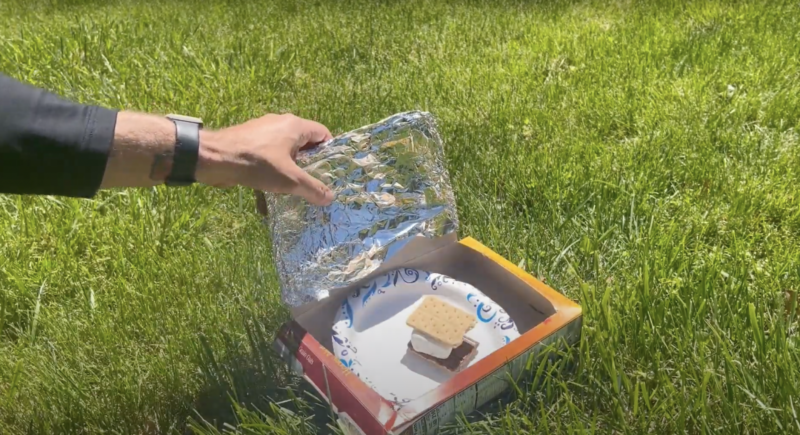
Make a solar oven
Difficulty: Easy / Materials: Basic
This experiment is great particularly if you live in a hot, sunny area. Students create an oven using a cereal box and materials they have around the house. Then, use it to cook a s’more.
Learn more: Solar Oven Science Experiment
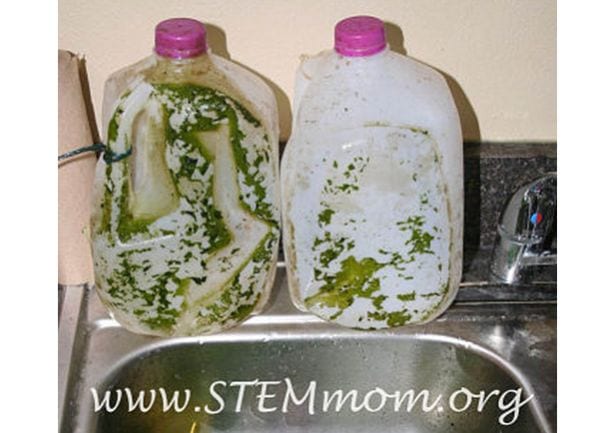
Grow biofilm
Difficulty: Medium / Materials: Medium
Biofilm are the bacteria that grow on surfaces. Students can grow biofilm, and explain how they may grow differently on different surfaces. They can also explain any benefits or drawbacks to having biofilm on surfaces.
Learn more: Biofilm Experiment

Plant light maze
Difficulty: Medium / Materials: Basic
Students build a maze for a plant to grow through using a shoebox with obstacles students build in and a light source at one end. This experiment takes some planning but the result is impressive.
Learn more: Plant Light Maze

Make a solar eclipse viewer
If you have a science fair that occurs during a solar eclipse event, making a solar eclipse viewer and documenting the experience of viewing and understanding the eclipse makes a great science project.
Learn more: Make a Solar Eclipse Viewer
Demonstrate phototropism
Difficulty: Easy / Materials: Medium
Phototropism is the way that plants move in response to light. Students set up a demonstration and record what happens. They can use paper and pencil or a video to show and explain what happens to their plants.

Record bird sightings
This is a great way to build a love of birding for life. Students can make and hang their bird feeders, then record their data over a month or more and share it at the fair.
Learn more: Cornell Lab Project FeederWatch

Use Oreos to model mitosis
A 7th grade science activity that doubles as a sweet treat? Your students are going to love this activity using Oreo cookies and colorful sprinkles to make cellular mitosis models.
Learn more: Oreo Mitosis

Model meiosis with pipe cleaners
Meiosis is similar to mitosis, but it’s specific to the production of gametes. These hands-on models use basic materials like pipe cleaners and beads to make the process easier to visualize.
Learn more: Meiosis Models

Jelly-bean genetics
If you’re learning about how genetic traits are passed along from parent to child, try this jelly-bean demo. When you’re finished, you can enjoy a sweet treat!
Learn more: Jelly Bean Genetics
Model the carbon cycle
Take students’ knowledge of cycles up a notch by focusing on the carbon cycle. Students create and explain a model of the carbon cycle. (Bonus: add in some physics and see if students can add movement to their models.)
Measure carbon content
In this experiment, students measure the carbon content in various household products.

Create a taxonomy system
Students can step into Linnaeus’ shoes by creating their own system of taxonomy using a handful of different dried beans. This is a fun 7th grade science project to do in groups, so students can see the differences between each group’s system.
Learn more: Taxonomy Project

Watch the greenhouse effect happen
Climate change can be a contentious topic, so start by teaching kids about the greenhouse effect, which is easy to see and understand. Then, urge them to explore data collected by other scientists so they can learn to make informed decisions about topics like global warming.
Learn more: Greenhouse Effect

Model cell membranes with bubbles
Students learn about cell membranes and teach others using bubbles in this demonstration.
Learn more: Cell Membrane Bubble Lab
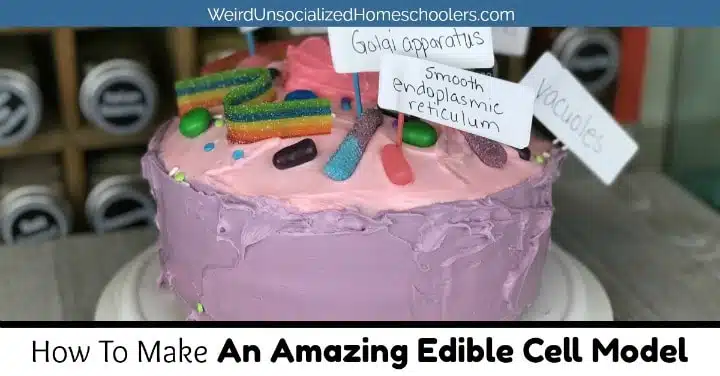
Bake a cell model
Sure, students could build a cell model out of clay, but cake and candy are so much more delicious! Check out the link below to see how one teacher does it.
Learn more: Edible Cell Model

Simulate natural selection
Travel to the Galápagos Islands and follow in Darwin’s footsteps as students explore finch beak adaptations in this clever natural selection lab.
Learn more: Natural Selection Lab
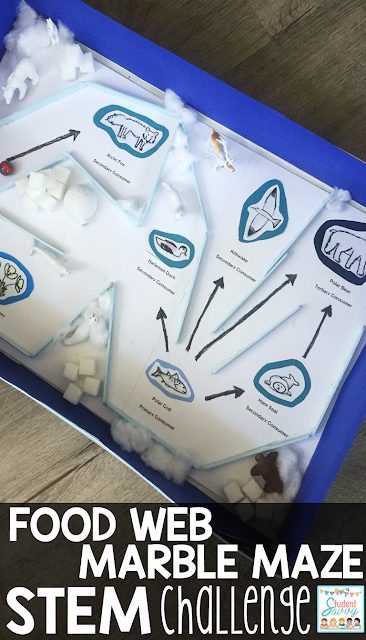
Food chain marble maze
Combine a STEM challenge with learning about food webs in this clever project. Kids will love the hands-on aspect, and it will really help the learning stick.
Learn more: Food Web Marble Maze
Water filtration
Show how different materials filter water and how we can clean water using different methods. Students can create filters with one type of material in each, and different combinations to compare how well each filters water.
Acid rain and plants
Show how acid rain impacts plants. This experiment provides a good, dramatic result for students to showcase.

Create a grow box
Students show what they know about how plants grow and what they need by creating a grow box. Students who are especially interested in building will enjoy this project.
Learn more: Build a Grow Box
Best Chemistry Science Fair Ideas for 7th Grade
Chemistry experiments can be the most fun because they create the biggest bang, literally. Here are a variety of chemistry science experiments that 7th graders can run with.
Freeze water in an instant
Explore the concept of nucleation (the process of chain reactions) by turning water into ice in seconds! Make this a 7th grade science fair project by trying the same process with other liquids.

Model homeostasis
Difficulty: Medium / Materials: Advanced
This is such a fun way to teach kids about the concept of homeostasis. Get all the instructions you need at the link.
Learn more: Homeostasis Lab

Make teabags fly
This easy experiment is a cool way to show kids how heat affects air molecules, making hot air rise. They’ll need some supervision with the fire, so try this out on the playground for extra safety.
Learn more: Flying Tea Bag Experiment

Show how salt impacts density
Explore the salinity of various bodies of water, then re-create their waters to see if you can make an egg float or sink. Experiment with other objects too.
Learn more: Saltwater Density
Make a density rainbow
We learn early on that oil floats on water, but where do other liquids fit in? Students find out when they conduct this colorful density experiment that has them layer different substances, making a rainbow.
How materials impact teeth
Show how different liquids impact our teeth using eggs as a stand-in for our pearly whites. A great experiment to talk about practical implications.

The magic milk experiment, where students show how molecules and substances interact, is a great one to do on the spot. Push the science by having students explain what is happening at the molecular level and hypothesize how this interaction could happen using other substances.
Learn more: Magic Milk Experiment
Split water
Difficulty: Advanced / Materials: Advanced
Students use a battery and pencils to show how water splits into hydrogen and oxygen. They can tell which gas is which by observing the number of bubbles that are in each stream (hydrogen will have double the bubbles as oxygen). This is another great experiment to model at the fair.

Fizzy driving car
Show how a chemical reaction (candy and soda) can power a car. Students can demonstrate and be ready to answer questions about how this reaction is strong enough to move an entire car.
Learn more: Candy & Soda Balloon Experiment
At the speed of melting ice
This is another experiment that can be done at home and reported on at school. Students put ice into different bowls and see which conditions make it melt fastest. Challenge 7th graders by having them create their conditions to isolate the dependent variable as much as possible, and to be as specific as possible in their explanation.
Elephant toothpaste
Who doesn’t love an exploding experiment? This experiment uses a reaction between hydrogen peroxide and yeast, soap, and food coloring to create a huge multi-colored foam explosion.
Learn more: Elephant Toothpaste Experiment
Invisible ink
Students who want to understand how chemicals react can use basic household materials to create invisible messages, and teach their friends how to do the same. Explain the reaction and set up a station for students to explore how to write their own invisible messages.

Mentos and Coke explosion
This is an experiment that kids may have done at home, but bring it to the science fair by having them dissect what’s happening at the molecular level.
Learn more: Mentos and Coke Experiment
Translucent egg experiment
Students explain acids, bases, and chemical reactions with this demonstration. They’ll have to conduct the experiment at home and be ready to answer questions on fair day.
Learn more: Egg and Vinega r Experiment
Polymer bouncy balls
Another science demonstration with a fun outcome. Students demonstrate how changing the ingredients that you use to make a ball changes its properties.
Make rock candy
Show how crystals grow, and how seed crystals change the rate that rock candy grows by making different batches of rock candy and seeing which factors impact the final result.
Metal corrosion
In this experiment, students set up the conditions for different materials to rust and then collect data as the materials, well, rust. It’s a good way to practice a controlled experiment and data collection.
Mummified hot dog
Use baking soda to mummify a hot dog and explain how chemical reactions can change something, like a hot dog, dramatically.
Make fluffy slime
What would a science fair be without slime? Challenge students to make slime with different substances to predict and learn how it turns out.
Learn more: How To Make Slime
Boiling point of water
Students add varying amounts of salt and other soluble materials to water and see how it affects the boiling point. A great opportunity for data collection.
Make a lava lamp
Students demonstrate a common chemical reaction by making a lava lamp. This is a fun option for a science fair project because students can lead participants through the process.
Best Physics Science Fair Ideas for 7th Grade
Physics experiments and projects are all about moving things around in lots of different ways. These cool physics experiments will test students’ physics knowledge and perseverance as they try to get their projects to work just right.
Generate electricity
In this science fair project, kids build a generator from scratch. Turn it into an experiment by varying the materials to see if you can increase the amount of energy it produces.
Test balloon elasticity
Explore whether heat and cold have an effect on elasticity using balloons. Try this with other materials too to expand the project.
Learn more: Balloon Science
Make a pet auto-feeder
Can you build a device that feeds your pets automatically? Even better, can you make it inexpensive and easy for others to build too? This project has real practical applications.

Design a pinball machine
Give your class basic supplies like rubber bands, plastic cups, and cardboard boxes. Then challenge them to create their very own pinball machines!
Learn more: Pinball STEM Challenge
Demonstrate centrifugal force
This classic science experiment teaches kids about centripetal force. Be forewarned: This could potentially make a bit of a mess, so consider where this science fair project is placed.
Another way to demonstrate centrifugal force
Here’s another way to demonstrate centrifugal force. Students can set up the demonstration and let participants try it out.
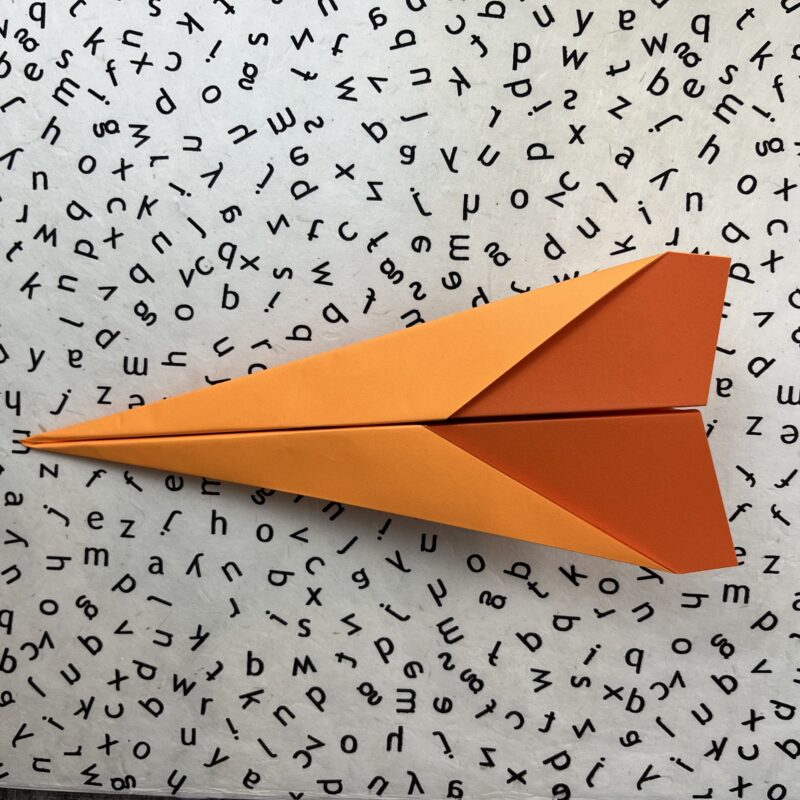
Paper airplane dynamics
Students can explore aerodynamics by making and testing paper airplanes. Which paper airplane features make the plane fly the farthest? How does aerodynamics explain this?
Learn more: Paper Airplane Designs
Potato battery
Another way to make a battery—students can use what they have in their pantry. After they create a potato battery, they figure out how to use it and explain why it works.
Paper roller coaster
Test and demonstrate the laws of physics with a paper roller coaster. This is a great fair experiment because participants can join in the fun, sending marbles along each roller coaster students make.
Maglev train
Show how magnets work with a maglev train. Students use wooden blocks with magnets to show how magnets can attract and repel to create movement or attraction.

Tornado in a bottle
Another classic science experiment, students show how tornadoes funnel using 2 liter bottles, water, and a tornado connector tube. Add LEGO bricks or small toy animals to show how a tornado impacts objects it comes into contact with.
Learn more: Tornado in a Bottle
Demonstrate waves
Students learn about compression and transverse waves, and how to show each with a common slinky. This is a great project for a student who has mastered the middle school content and is ready for more.
Learn more: Teaching Students About Waves
Balloon-powered car
Use a balloon and building materials to create a car that shows how force works. If more than one student selects this as their project, compare the result. Which car moves the fastest and why?
How the strength of a magnet varies by temperature
Students test how strong magnets are, and what happens when the magnet changes either by heating up or cooling down.
Measure the surface tension of water
Students research surface tension and how to measure it, then they set up their station and teach others how to understand surface tension.
Penny battery
Make a battery using pennies, aluminum foil, and a water-salt solution. Seventh graders can explain what’s happening to make the battery work and find a creative way to show the power of their battery.
Best Engineering Science Fair Ideas for 7th Grade
For students who like to build, build, build, engineering projects are a perfect science fair project. These engineering ideas are doable for middle schoolers and have practical applications they can talk about.
Make a robotic hand
Students engineer a robotic hand and can demonstrate it at the science fair. So cool!
Light switch box
Students learn about electricity while making a light switch box. Challenge them to find a practical use for their new knowledge about how electricity works.

Rubber band helicopter
Create a helicopter and explain how it flies using materials you have around the house. Students can also get creative using different-size rubber bands or testing various materials that are heavier or lighter.
Learn more: Rubber Band Helicopters
Design an eco-friendly house
This project requires research into what makes a house eco-friendly, and then creativity to design a house model that would be eco-friendly. Students can also calculate the amount of carbon their house would save if it were functioning.
Make a windmill
Difficulty: Advanced / Materials: Medium
Another eco-friendly idea, have students make a windmill. If they can get it going and producing energy, they’ll really have something to show off.
Design a weather-proof house
Students choose a type of extreme event (earthquake, tornado, hurricane) and design a house or structure that they think would sustain that event. Then, they test it on a small scale and talk about their results.

Build a hydraulic lift
Design a lift using water. Such a cool way to demonstrate engineering and physics.
Learn more: Design a Hydraulic Elevator
Make a Rube Goldberg machine
Difficulty: Advanced / Materials: Basic
The idea behind a Rube Goldberg machine is to create a complex machine to solve a simple problem. This is a great project for students who want an extra challenge.
Make a weather station
This project can be as complicated or simple as students want. They can show ways to measure and track weather using household objects, or they can figure out how to use solar power to provide energy to power a station. Either way, they’ll have something to talk about.
Buy it: DIY Weather Station at Amazon
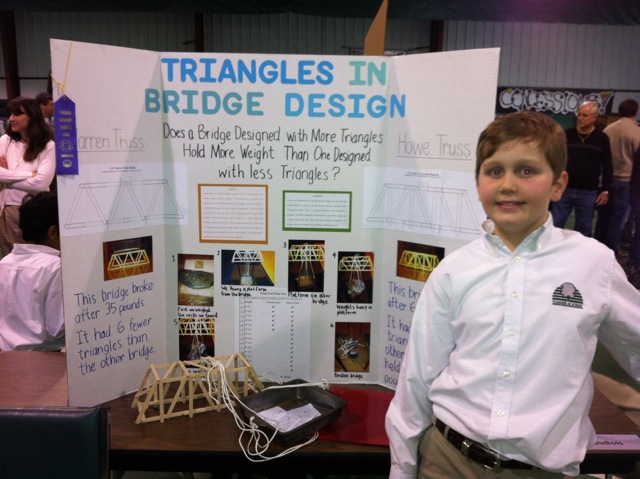
Bridge design
There’s a lot students can do with bridges: design them and analyze the structure and load they can take, measure how well they do in simulated disasters, and see how much support a bridge needs to span a long distance. The possibilities are endless!
Learn more: Check out how one student tackled bridges in his science fair project.

Design a catapult
Students learn the engineering and physics of catapults, and set up various examples for participants to try. Students can make catapults as large or small as they want.
Learn more: Catapult Project
Make a pendulum
Students research pendulum and movement, and then create various demonstrations, like this paint pendulum, to show participants how pendulums work.
Make a saltwater battery
Students demonstrate how to use salt water to create a battery and move voltage from one location to another.
Earth Science Project Ideas for 7th Grade
You’ll always have students who are into rocks, dinosaurs, the earth, and more. These ideas allow those students to dive deep (pun intended) into geology and earth science.

Test how hard rocks are
Yes, all rocks are hard, but some are harder than others. Students learn about how rocks are classified, collect and test rocks in your area, and present what they learn.
Learn more: Rock Experiment
Show plate tectonics with crackers
Students research plate tectonics and use graham crackers and frosting to model them. Delicious and educational!
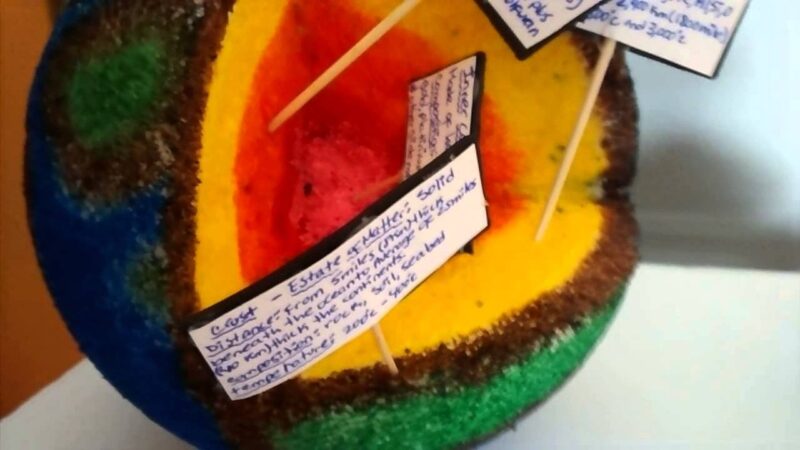
Make the layers of Earth
Students may be familiar with the layers of Earth, but allow students to dig deeper by figuring out a way to present the layers incorporating detail and explanation that go beyond the crust.
Learn more: The Layers of the Earth

Explain oil spill cleanup
Students research how oil can be cleaned up and model it on a small scale. This project combines physics, chemistry, and earth science.
Learn more: Oil Spill Cleanup
Volcano eruption
This is a classic science fair experiment, but it’s worth including because 7th graders can take the explanation and volcano models to the next level with their research and explanation.
Learn more: Baking Soda Volcano Experiment
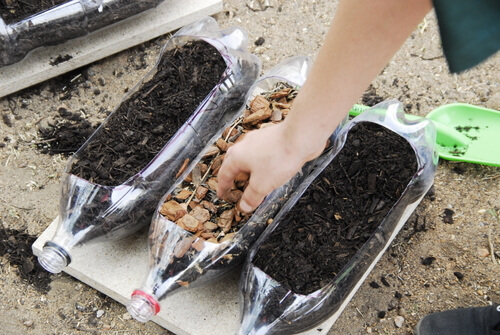
Soil erosion experiment
Students show how soil erodes and discuss the implications for gardening, planners and construction, and the earth in general.
Learn more: Soil Erosion Experiment
Also check out 34 Famous Scientists Everyone Should Know .
Plus, sign up for our newsletters and get all the latest teacher tips and ideas straight to your inbox, you might also like.
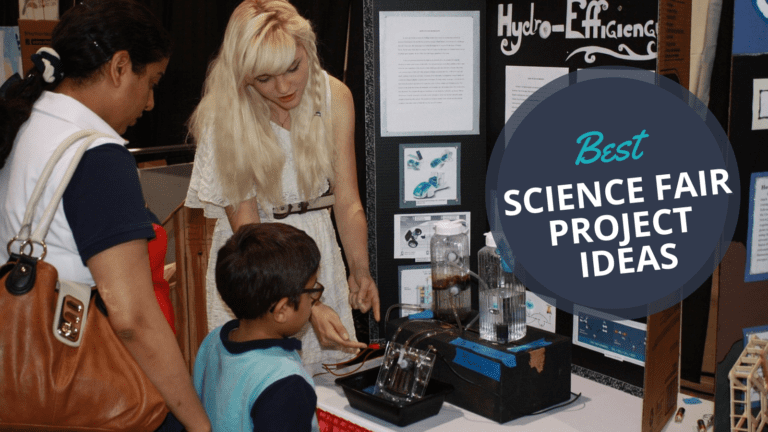
The Big List of Science Fair Project Ideas, Resources, and More
Options for every age, interest, and skill level! Continue Reading
Copyright © 2024. All rights reserved. 5335 Gate Parkway, Jacksonville, FL 32256

275+ Cool Science Fair Project Ideas for 7th Grade
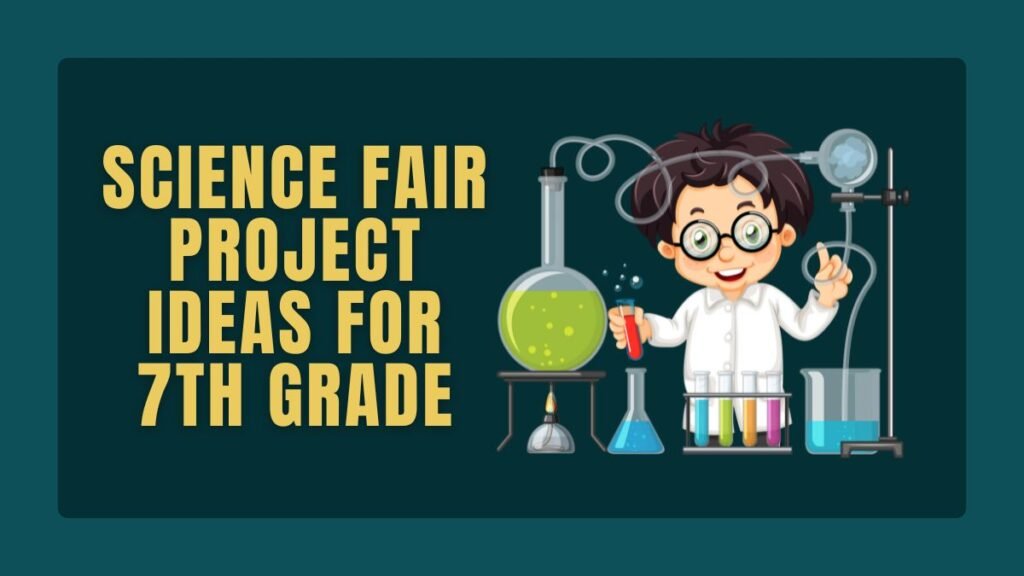
Discover simple and fun science fair project ideas for 7th grade! These easy experiments will help you learn and impress at the science fair.
Want to create an awesome science fair project? Whether you’re curious or love experiments, this guide has great ideas for 7th graders. These projects are easy, fun, and will help you learn cool science.
You can explore topics like how liquids affect plants, build fun models, or try chemistry experiments.
Let’s jump in and find a project that’s perfect for you. These ideas will help you learn and have fun, and maybe even win a prize at the science fair!
Table of Contents
Science Fair Project Ideas for 7th Grade PDF
Importance of science fairs.
Have a close look at the importance of science fairs:
- Sparks Curiosity : Science fairs make students excited to learn.
- Teaches Problem-Solving : Students learn to ask questions and find answers.
- Boosts Creativity : Students create unique projects.
- Develops Research Skills : Students practice gathering and using information.
- Improves Speaking Skills : Presenting teaches how to talk in front of others.
- Encourages Teamwork : Group projects teach working together.
- Builds Confidence : Completing a project helps students feel proud.
- Opens Career Paths : Students discover interest in science careers.
- Promotes Critical Thinking : Students learn to think carefully and test ideas.
- Celebrates Success : Science fairs recognize hard work and new ideas.
Science Fair Project Ideas
Here are some of the best science fair project ideas:
- Test how light travels through different materials.
- Investigate how friction affects motion.
- Study how magnets attract and repel objects.
- Test how the weight of an object affects its fall speed.
- Measure how sound changes with different materials.
- Investigate how air pressure affects balloon size.
- Study how objects bounce on different surfaces.
- Measure how temperature affects the speed of a ball rolling down a ramp.
- Test how the angle of a ramp changes the speed of a car.
- Investigate how heat moves through different materials.
- Test how temperature affects the speed of a chemical reaction.
- Investigate how different substances react to vinegar.
- Study how baking soda and vinegar create gas.
- Explore how acids and bases react with indicators.
- Test how salt affects the freezing point of water.
- Study how sugar dissolves in hot and cold water.
- Investigate how different materials dissolve in water.
- Study how temperature affects the rate of rusting.
- Test how soap works to clean dirty water.
- Study how different metals react with water.
- Grow plants under different light conditions.
- Investigate how the amount of water affects plant growth.
- Study how exercise affects your heart rate.
- Test how sugar affects yeast growth.
- Study how germs spread using soap.
- Investigate how temperature affects how fast plants grow.
- Explore how insects help plants grow.
- Study how animals adapt to different environments.
- Test how food affects the health of bacteria.
- Investigate how different liquids affect plant roots.
Earth Science
- Study how rocks break down over time.
- Test how wind shapes sand dunes.
- Measure the temperature of soil at different depths.
- Investigate how different types of soil affect plant growth.
- Study how erosion changes landscapes.
- Test how salt affects soil moisture.
- Investigate how plants grow in sandy and clay soils.
- Measure how sunlight affects soil temperature.
- Study how soil moisture affects plant growth.
- Investigate how different materials affect water runoff.
- Study how the moon affects the tides.
- Investigate how craters form on the moon.
- Measure how long it takes sunlight to reach Earth.
- Study how different planets move around the sun.
- Observe how the stars change position through the year.
- Test how different surfaces affect the reflection of light.
- Study how the Earth’s rotation affects day and night.
- Investigate how planets differ in size and composition.
- Study how a telescope works.
- Explore how the sun’s energy affects Earth.
- Build a simple robot and test how it moves.
- Study how different shapes of paper airplanes fly.
- Test how materials affect the speed of a car.
- Investigate how different gears affect speed.
- Study how a pulley system can lift objects.
- Build a simple bridge and test how much weight it can hold.
- Test how different materials affect sound in a speaker.
- Investigate how simple machines make work easier.
- Build a simple electrical circuit and test how it works.
- Study how wind turbines generate electricity.
Health Science
- Study how handwashing prevents the spread of germs.
- Test how different foods affect your energy.
- Investigate how exercise affects heart rate.
- Study how different sleep patterns affect focus.
- Test how water affects your body’s hydration.
- Investigate how stress affects the body.
- Study how vitamins and minerals affect health.
- Measure how the weather affects your mood.
- Investigate how sugar affects your teeth.
- Study how different foods affect digestion.
- Study how sunlight affects plant growth.
- Test how different soils affect plant health.
- Investigate how plants adapt to different environments.
- Study how plants spread their seeds.
- Test how different types of water affect plants.
- Investigate how plant roots grow in soil.
- Study how pollination works in flowers.
- Test how temperature affects plant growth.
- Study how plants help improve the air.
- Investigate how plants change during different seasons.
- Study how animals use camouflage to hide.
- Investigate how animals communicate with each other.
- Test how animals react to changes in temperature.
- Study how animals adapt to their environment.
- Investigate how animals find food in the wild.
- Study how animals sleep and rest.
- Investigate how animals interact in groups.
- Study how animals care for their young.
- Test how animals react to new smells.
- Study how animals build shelters.
Geography & Climate
- Investigate how different climates affect plant growth.
- Study the relationship between latitude and temperature.
- Measure rainfall in different regions.
- Investigate how winds affect local climates.
- Study the effects of climate change on weather.
- Explore how natural disasters shape landscapes.
- Study how cities change the climate.
- Investigate how altitude affects temperature.
- Study how water bodies affect nearby weather.
- Investigate how geography affects storm patterns.
Electricity & Magnetism
- Build a simple electric circuit.
- Test how wire thickness affects electricity flow.
- Study how magnets affect metal objects.
- Build an electromagnet and test its strength.
- Investigate how different batteries power a motor.
- Build a simple generator.
- Test how different materials affect electrical resistance.
- Study how magnets work with other magnets.
- Test how temperature affects electrical resistance.
- Build a small electric motor.
Marine Science
- Study how salt affects plant growth in water.
- Investigate the impact of pollution on marine life.
- Study the role of coral reefs in the ocean.
- Explore how ocean currents affect fish movement.
- Study how temperature changes affect ocean life.
- Investigate how ocean acidification affects shellfish.
- Measure how oil spills affect ocean water.
- Study the different types of ocean ecosystems.
- Test how plastic pollution harms marine life.
- Investigate how sea plants help oxygenate the water.
Meteorology
- Study how clouds form and what they mean.
- Build a simple weather station.
- Study how hurricanes develop.
- Investigate how wind affects cloud movement.
- Test how pressure affects weather.
- Create a weather map and predict local weather.
- Study how solar energy impacts weather.
- Investigate how the jet stream affects weather.
- Study how ocean temperatures affect hurricanes.
- Measure how seasons affect the weather.
Forensic Science
- Study how fingerprints are used for identification.
- Investigate how DNA helps solve crimes.
- Study blood spatter patterns.
- Investigate how footprints are used in investigations.
- Study how fibers help solve crimes.
- Investigate how gunshot residue is detected.
- Study how soil samples are used in investigations.
- Investigate how decay helps estimate time of death.
- Study how chromatography is used in forensics.
- Investigate how evidence is collected in a crime scene.
- Study how traits are passed in pea plants.
- Investigate how mutations change gene expression.
- Study how genes are inherited in fruit flies.
- Investigate how genetic variation affects populations.
- Study how the environment impacts gene expression.
- Investigate how selective breeding works.
- Study how genetic disorders are passed down.
- Investigate the ethics of cloning.
- Study how genetic markers help predict diseases.
- Test how gene editing changes plant growth.
Social Sciences
- Study how culture affects behavior.
- Investigate how social media changes communication.
- Study how people make group decisions.
- Investigate how stereotypes affect people’s actions.
- Study how traditions change over time.
- Investigate how family roles differ in cultures.
- Study how geography affects local economies.
- Investigate how language changes in different regions.
- Study how immigration affects society.
- Investigate how laws influence social behavior.
- Study how memory works.
- Investigate how emotions affect behavior.
- Study how people learn new skills.
- Investigate how peer pressure affects decisions.
- Study how stress impacts the brain.
- Test how sleep affects mood.
- Study how attention changes with distractions.
- Investigate how people form opinions.
- Study how self-esteem influences behavior.
- Investigate how cognitive biases impact decisions.
Engineering
- Design a bridge and test its strength.
- Build a simple machine to lift an object.
- Investigate how different materials affect construction.
- Study how gears work to transfer motion.
- Test how air resistance affects objects in motion.
- Investigate how the size of wheels affects speed.
- Study how levers work to lift heavy objects.
- Test how different materials affect heat conduction.
- Investigate how pulleys help lift heavy objects.
- Study how inclined planes help move objects.
- Study how supply and demand affect prices.
- Investigate how inflation affects the economy.
- Study how saving money impacts financial stability.
- Investigate how taxes affect people’s spending.
- Study how trade benefits countries.
- Investigate how banks help the economy grow.
- Study how interest rates affect loans.
- Investigate how advertising influences consumer behavior.
- Study how government policies affect businesses.
- Investigate how the stock market works.
Anthropology
- Study how early humans lived.
- Investigate how tools were used in ancient cultures.
- Study how language helps people communicate.
- Investigate how ancient cultures communicated through art.
- Study how families differ across cultures.
- Investigate how food affects culture.
- Study how cultural practices differ in different parts of the world.
- Investigate how beliefs shape society.
- Study how clothing styles reflect culture.
- Investigate how migration affects culture.
Why Science Projects Matter in 7th Grade
Here are the reasons why science projects matter in 7th grade:
- Encourages Curiosity : Science projects help 7th graders explore new ideas.
- Teaches Problem-Solving : Students learn how to find answers by testing ideas.
- Develops Critical Thinking : Students think about why things happen in their experiments.
- Boosts Creativity : Science projects let students come up with new ideas.
- Improves Research Skills : Students practice finding and using information.
- Builds Confidence : Finishing a project makes students feel proud.
- Prepares for Future Classes : Science projects help with learning in future science classes.
- Teaches Teamwork : Working together helps students learn how to collaborate.
- Improves Communication : Students practice explaining their ideas clearly.
- Makes Science Fun : Hands-on projects make science more exciting.
How to Choose the Right Science Fair Project ?
Here are the best steps to choose the right science fair project:
- Pick What You Like : Choose a topic that interests you.
- Learn Something New : Pick a project that helps you explore new ideas.
- Check the Supplies : Make sure you have everything you need.
- Choose Something Manageable : Pick a project that fits your time and skills.
- Look at Your Resources : See if you have enough space and help.
- Pick Easy to Explain : Choose a project you can talk about easily.
- Try Hands-On Projects : Hands-on experiments are often more fun.
- Ask for Help : Get advice from your teacher or family.
- Make Sure It’s Science : Choose a project with clear science.
- Have Fun : Pick something exciting to enjoy the process!
Science Fair Project Ideas for 7th Grade
Here are some of the best science fair project ideas for 7th grade:
- Keep It Simple : Explain your project clearly.
- Be Organized : Follow a clear order – intro, experiment, results, conclusion.
- Use Visuals : Show pictures or charts to help explain.
- Practice : Go over your presentation to feel ready.
- Speak Slowly : Talk at a pace everyone can follow.
- Stay on Topic : Stick to the main points.
- Be Excited : Show that you like your project.
- Use Easy Words : Keep the language simple and clear.
- Engage the Audience : Ask questions or share fun facts.
- Stay Calm : Take deep breaths and relax.
How to Make a Hypothesis and Test It?
Here are the best ways to make a hypothesis and test it:
- Make a Guess: Think about what you want to test and make an educated guess about the outcome. This is your hypothesis.
- Ask a Question: Start with a question you want to answer. For example, “What happens if I use more sunlight on plants?”
- State Your Hypothesis: Write your guess in a simple sentence. For example, “I think plants with more sunlight will grow taller.”
- Test Your Hypothesis: Set up an experiment to test it. Make sure to control all factors except the one you’re testing.
- Collect Data: Measure and record what happens during your experiment.
- Look at the Results : See if your guess was correct.
- Conclusion : Say if your guess was right or wrong, and explain why.
Safety Tips for Science Experiments
Here are the safety tipes for science experiements:
- Wear Safety Gear : Use goggles and gloves.
- Follow Instructions : Read the steps.
- Keep Area Clean : Keep your space neat.
- Be Careful with Chemicals : Handle chemicals carefully.
- Use Tools Safely : Be careful with sharp objects.
- Work in a Safe Area : Ensure good airflow.
- Know Emergency Steps : Know where the first-aid kit is.
- Ask for Help : Ask an adult if unsure.
- Clean Up : Clean up after the experiment.
- Stay Focused : Focus on your work.
Common Mistakes to Avoid in Science Projects
Here are the common mistakes to avoid in science projects:
- Not Planning Ahead : Start early and make a clear plan.
- Skipping Research : Always do some research before starting.
- Ignoring Safety : Don’t forget to follow safety rules.
- Not Measuring Carefully : Be precise with measurements.
- Rushing Through the Experiment : Take your time to do it right.
- Not Recording Data : Write down everything you observe.
- Not Asking for Help : Ask for help if you’re unsure about something.
- Using Wrong Materials : Make sure you have the right supplies.
- Not Following Instructions : Stick to the steps in the instructions.
- Forgetting to Clean Up : Always clean up after the experiment.
Science Fair Project Ideas for 7th Grade Easy
Here are some easy science fair ideas for 7th grade:
Which Sugar Makes Bigger Bubbles?
- Test: Which sugar makes the biggest bubbles?
- Materials: Sugar, dish soap, water, straw.
Does Music Help Plants Grow?
- Test: Does music help plants grow faster?
- Materials: Plants, music, pots, water.
Which Balloon Moves Faster?
- Test: Does a cold or warm balloon move faster?
- Materials: Balloons, water (hot and cold), stopwatch.
Which Toothpaste Works Best?
- Test: Which toothpaste cleans better?
- Materials: Toothpaste, toothbrush, eggshells.
Which Paper Soaks Up More Water?
- Test: Which paper absorbs the most water?
- Materials: Different papers, water.
Does Salt Water Freeze Faster?
- Test: Does salt water freeze faster than regular water?
- Materials: Salt, water, freezer.
Which Surface Makes a Car Go Faster?
- Test: Does a smooth or rough surface make a car go faster?
- Materials: Toy car, different surfaces, stopwatch.
Does More Water Help Seeds Grow?
- Test: Do seeds grow better with more or less water?
- Materials: Seeds, water, pots, soil.
Which Material Keeps Ice from Melting?
- Test: Does cotton, wool, or foil keep ice from melting?
- Materials: Ice, materials, timer.
How Does Exercise Affect Your Heart Rate?
- Test: How does exercise change your heart rate?
- Materials: Stopwatch, heart rate monitor.
These ideas are simple and easy for 7th-grade science fairs!
Last Minute Science Fair Projects for 7th Grade
Here are some super simple last-minute science fair project ideas for 7th grade:
Water and Plant Growth
- Test: Which water makes plants grow best?
- Materials: Plants, water, pots.
Balloon Bounce
- Test: Which shape of balloon bounces higher?
- Materials: Balloons, measuring tape.
Paper Airplanes
- Test: Which paper airplane flies the farthest?
- Materials: Paper, measuring tape.
Melting Ice
- Test: Does ice melt faster in hot or cold?
- Materials: Ice cubes, water, timer.
Bouncing Balls
- Test: Which surface makes a ball bounce highest?
- Materials: Ball, different surfaces.
Salt and Ice
- Test: Which salt melts ice faster?
- Materials: Ice, salt, timer.
Balloon Size
- Test: Does a small or large balloon pop sooner?
- Materials: Balloons, stopwatch.
Color and Heat
- Test: Does dark or light color heat up faster?
- Materials: Objects of different colors, thermometer.
Freezing Liquids
- Test: Which liquid freezes the fastest?
- Materials: Juice, soda, water, freezer.
Straw Speed
- Test: Does juice or water go through a straw faster?
- Materials: Straw, liquids.
These projects are easy to do in a short time!

Science Fair Project Ideas for 7th Grade Biology
Here are some simple 7th grade biology science fair project ideas:
How Light Affects Plant Growth
- Test : Does more light help plants grow faster?
- Materials : Plants, lights, pots, soil
Best Soil for Plant Growth
- Test : Which soil helps plants grow best?
- Materials : Different soils, plants, pots
Effect of Temperature on Frogs
- Test : Does temperature change frog behavior?
- Materials : Frogs, containers, temperature controls
- Test : Do plants grow better with music?
- Materials : Plants, speakers, music
Best Water for Fish
- Test : Does tap or filtered water work better for fish?
- Materials : Fish, water, tanks
Different Materials for Plant Growth
- Test : Does cloth, plastic, or paper affect plant growth?
- Materials : Plants, materials, pots, soil
Plants Without Water
- Test : How long can plants live without water?
- Materials : Plants, no water
Sugar Water and Plants
- Test : Does sugar water help or hurt plants?
- Materials : Plants, sugar, water
Insects and Plants
- Test : Do insects help or harm plants?
- Materials : Plants, insects, pots, soil
How Germs Spread
- Test : How do germs spread around the house or classroom?
- Materials : Germ powder or gel, surfaces, hand sanitizer
These easy biology projects will help you learn more about plants, animals, and germs!
7th Grade Science Project Ideas With Food
Here are some simple 7th grade science project ideas with food:
Which Milk Froths Best?
- Test : Which milk makes the best foam?
- Materials : Different types of milk, frother or whisk
How Temperature Affects Yeast
- Test : Does yeast grow faster in hot or cold water?
- Materials : Yeast, warm and cold water, sugar
Best Fruit for Juice
- Test : Which fruit makes the most juice?
- Materials : Different fruits, juicer
Salt and Ice Melting
- Test : Does salt make ice melt faster?
- Materials : Ice, salt, timer
Sugar and Boiling Water
- Test : Does sugar change the boiling point of water?
- Materials : Water, sugar, pot, thermometer
Which Fruit Ripens Fastest?
- Test : Which fruit ripens the quickest?
- Materials : Different fruits, paper bags
Food Coloring and Taste
- Test : Does food coloring change the taste of food?
- Materials : Food, food coloring, blindfold
Baking Soda in Pancakes
- Test : Does more baking soda make pancakes fluffier?
- Materials : Pancake mix, baking soda, griddle
Brown vs. White Sugar in Cookies
- Test : How do brown and white sugar affect cookies?
- Materials : Cookie dough ingredients, brown sugar, white sugar
Best Fruit for Natural Soda
- Test : Which fruit makes the best fizzy drink?
- Materials : Fruit juice, yeast, sugar, bottle
These simple projects will help you explore how food works in fun ways!
Environmental Science Fair Projects for 7th Grade
Here are some easy environmental science fair project ideas for 7th grade:
Recycling and Plant Growth
- Test : Does using recycled paper help plants grow?
- Materials : Recycled paper, seeds, soil, pots
Water Pollution and Plant Health
- Test : How does dirty water affect plants?
- Materials : Clean and dirty water, plants, pots
Energy Saving Light Bulbs
- Test : Do energy-saving light bulbs use less energy?
- Materials : Regular and LED light bulbs, energy meter, timer
Solar Power Water Heating
- Test : Does solar power heat water faster than other methods?
- Materials : Solar panel, water, thermometer, container
Decomposing Trash
- Test : How long does it take trash to break down?
- Materials : Food scraps, plastic, paper, containers, soil
Air Pollution and Plants
- Test : How does air pollution affect plants?
- Materials : Plants, smoke or fan, pots
Renewable Energy
- Test : Which renewable energy source works best?
- Materials : Solar panel, wind turbine, small fan or light bulb
Water Conservation
- Test : Which way of watering plants saves the most water?
- Materials : Different watering methods, plants, soil
Plastic Pollution in Water
- Test : How does plastic affect water life?
- Materials : Plastic items, water, fish or plants
Composting vs. Landfill Waste
- Test : Does composting break down waste faster than landfill?
- Materials : Organic waste, plastic waste, containers, soil
These projects will help you learn about the environment and how we can help protect it!
7th Grade Science Fair Projects With Independent And Dependent
Here are some 7th grade science fair project ideas with clear independent and dependent variables:
Plant Growth and Light
- Independent : Type of light (e.g., natural, fluorescent, LED)
- Dependent : Plant growth (height, number of leaves)
Water Filter
- Independent : Type of filter material (sand, charcoal , cotton)
- Dependent : Water clarity or cleanliness
Magnet Strength
- Independent : Number of magnets used
- Dependent : Number of paperclips picked up
- Independent : Type of protective material (bubble wrap, cotton, foam)
- Dependent : Whether the egg breaks or survives
Volcano Eruption
- Independent : Amount of baking soda
- Dependent : Size/height of the eruption
Freezing Water
- Independent : Amount of sugar added to water
- Dependent : Time it takes for the water to freeze
- Independent : Plane design (e.g., short, long, wide)
- Dependent : Distance flown by the plane
Solar Power
- Independent : Material used for the solar panel (black, white, foil)
- Dependent : Amount of energy produced
Invisible Ink
- Independent : Type of invisible ink (lemon juice, baking soda)
- Dependent : Clarity or visibility of the message when heated
Static Electricity
- Independent : Type of material rubbed on the balloon (wool, cotton)
- Dependent : Amount of paper attracted by the balloon
These projects are simple to set up, with one thing changing (independent) and another thing being measured (dependent).
In conclusion, science fair projects for 7th grade are a fun way to explore science and learn new things. These projects help you build important skills like problem-solving and thinking creatively.
Whether you are growing plants, testing water filters, or playing with static electricity, you’ll learn how to ask questions, make guesses, and look at results. Choose a project that interests you—it’ll make everything more exciting.
Remember to keep track of your variables and have fun while learning. Science is about curiosity, and your project is a great chance to discover new ideas and share them!
Related Posts
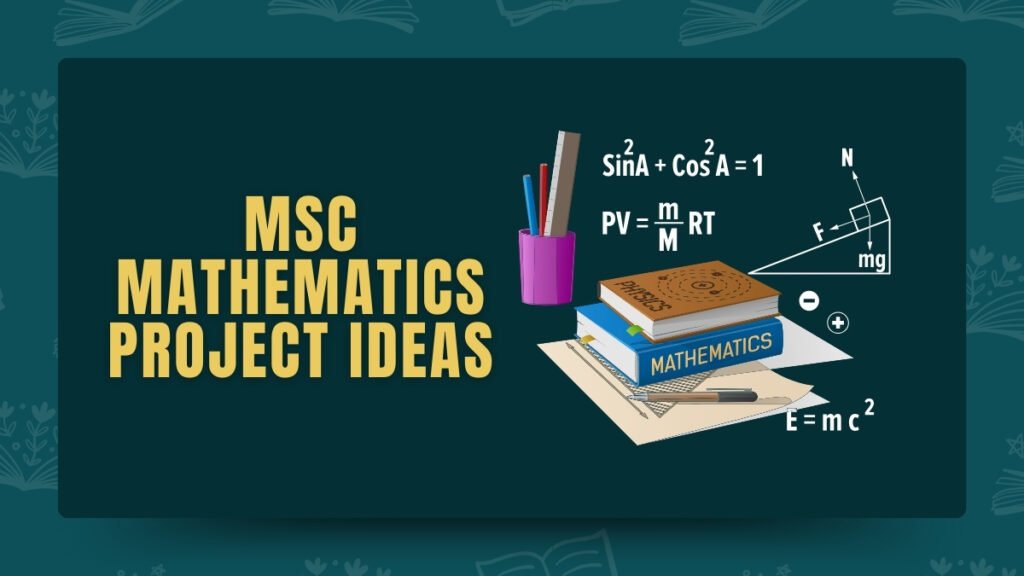
129+ Innovative MSC Mathematics Project Ideas for Students
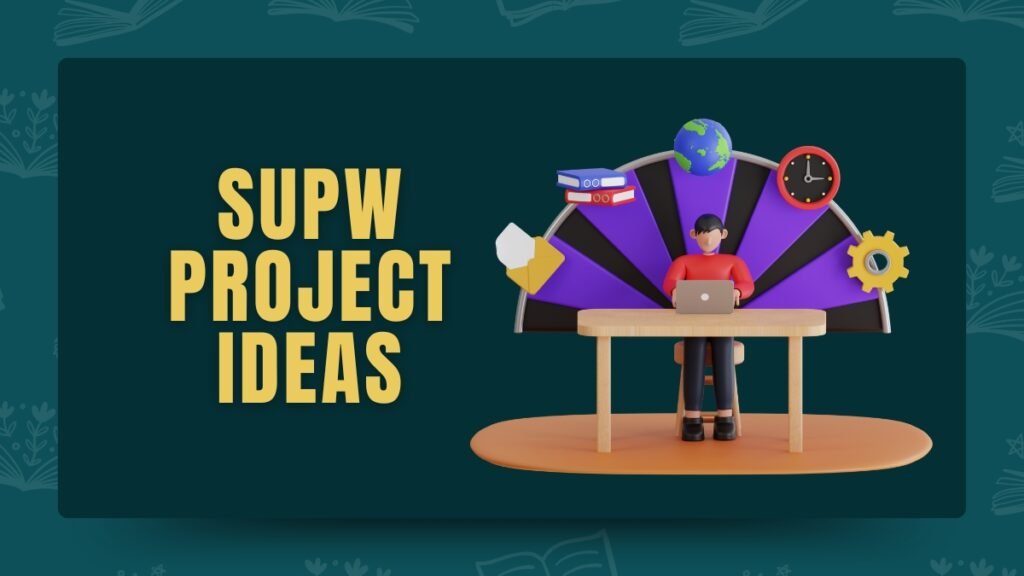
50 Most Innovative SUPW Project Ideas to Test Your Skills
Leave a comment cancel reply.
Your email address will not be published. Required fields are marked *
Save my name, email, and website in this browser for the next time I comment.
All Science Fair Projects
1000 science fair projects with complete instructions.

72 Science Projects for 7th Graders
Looking for engaging science fair projects for a middle school science fair? Our handpicked collection of science fair projects for 7th graders is a great place to start!
7th Grade Science Fair Project FAQ
What are some easy 7th grade science fair projects.
Each of these science fair projects are easy for seventh grade science students do. Explore how glow-in-the-dark sticks work, discover how far apart planets really are, and make your own geode crystal with borax!
Chocolate Asphalt
Making Lightning in a Pan
Glow Sticks: Temperature Effects
Geode Rock Borax Crystal
Does Cooking Deplete Vitamin C?
Solar System Scale Model on the Sidewalk
Color and Taste
Uncovering Fall Colors
Growing Mold
Carbonation and Packaging
Science fair project details right above the FAQ!
What is the best 7th grade science project ever?
We love the Fast Food Nutrition project for seventh grade science students. This project encourages students to look more closely at the nutritional value of fast food that's easily available. This project is not only a research project on fast food nutrition, but it also gives middle school students the opportunity to interview willing test subjects about their eating habits.
If you're looking for more 7th grade science projects, check out the 7th grade science fair projects at the top of this page!
Check out more Best Science Fair Projects →
What are some cool 7th grade science fair projects?
Get ready to be amazed by these super cool science projects for 7th graders! With just a few simple materials, students fascinated by the solar system, how things glow-in-the-dark, unexpected chemical reactions and more, will have too much fun!
Glowing in the Dark
Make Plastic from Milk
The Dissolving Meat Myth
What are 5 testable questions for 7th grade?
A testable question is a question that we can answer through a science experiment. To do this, we do a control science experiment, then we change one thing in the experiment to see how it affects what happens. This is how we can discover the answer to our question!
Here are some testable questions that our seventh grade science projects investigate.
Do detergents affect plant growth?
Can drink and food taste different just by changing its color?
Does the color of light affect photosynthesis?
Does temperature affect seed sprouting?
What makes popcorn pop?
Here are more testable questions along with their science projects →
What are the top 10 science projects for 7th grade?
These are our top 10 science projects for 7th grade, covering biology, chemistry, physics and engineering. Find out how sugary drinks affect teeth, make electricity with your own body or test your design and engineering skills by making a foil bug walk on water! These projects can be used as science fair project ideas or as a fun experiment!
Hamsters and Time of Day
Plant Density and Growth Rate
Water Strider Challenge: Make a Bug Walk on Water!
Human Body Battery
Left-Handedness and Mirror Writing
Making Antibubbles
Soil as an Electrical System
Tooth Decay Experiment with Eggs
Science project details right above the FAQ!
Can I do a 7th grade science fair project in a day?
Yes! Quick experiments or making a model can be a great option for a science fair project! If you want to do a quick science fair project, we have science project ideas on various topics to get you started.
The Solar System: See it in the correct scale!
Create your own sidewalk chalk solar system model and take a walk through space! Solar System Scale Model on the Sidewalk
Chromatography reaction: Separating out colors!
Have you ever wondered why leaves change color in the fall? Let's find out by in this chemistry experiment using chromatography to separate the colors of a green leaf! Uncovering Fall Colors
Heat reactions: Heat speeds things up!
Does the temperature of a room affect how quickly a candle burns? Burn Rate of a Candle
What are some hands-on ways to find inspiration for my science fair project?
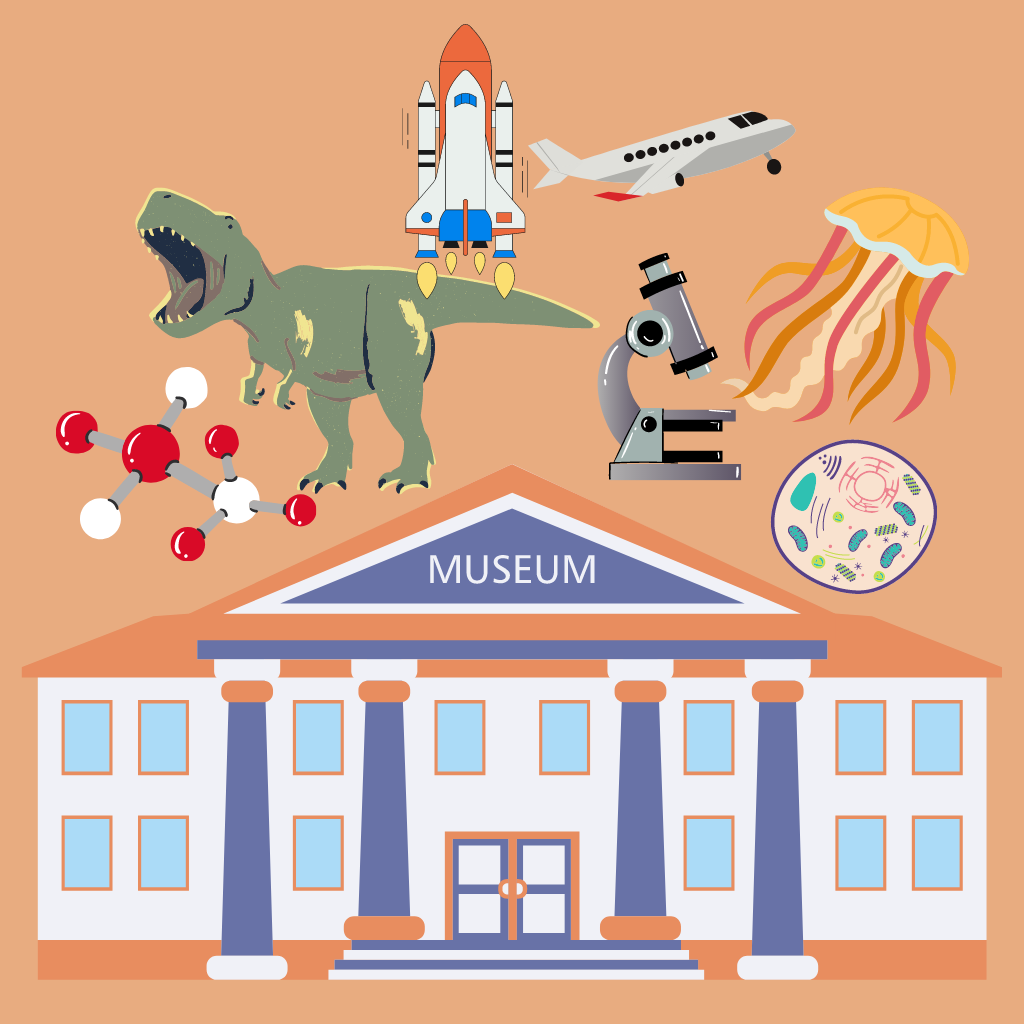
There may be free admission days or free passes to a science museum near you! Check your local library for free museum passes, nearby science museums for free entrance days and your credit card for offers.
Find a science museum near you and prepare to be awed by all that you can learn there! I always learn something new and am inspired whenever I go to a science museum!
How do I start a science fair project?
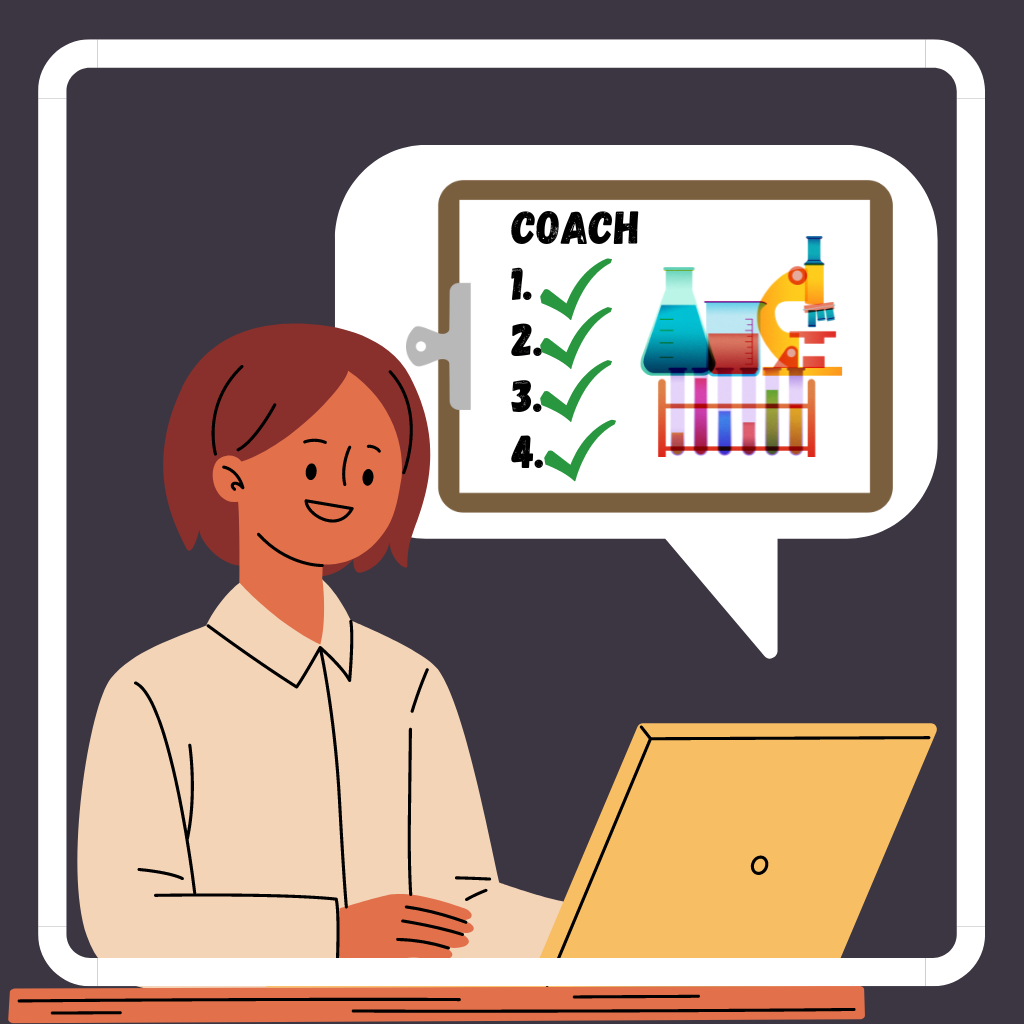
What should I do after I have a science fair project idea?

How do I make a science fair board?
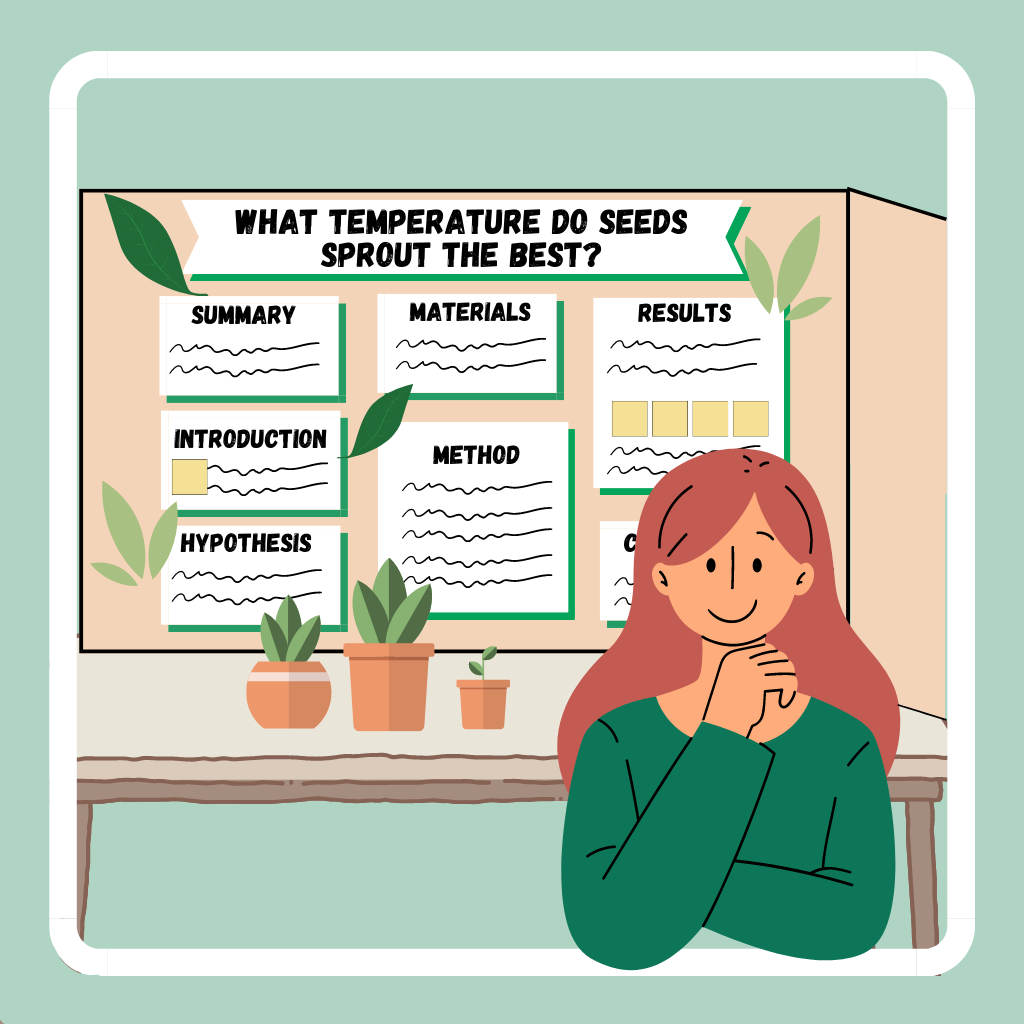
What is the scientific method?
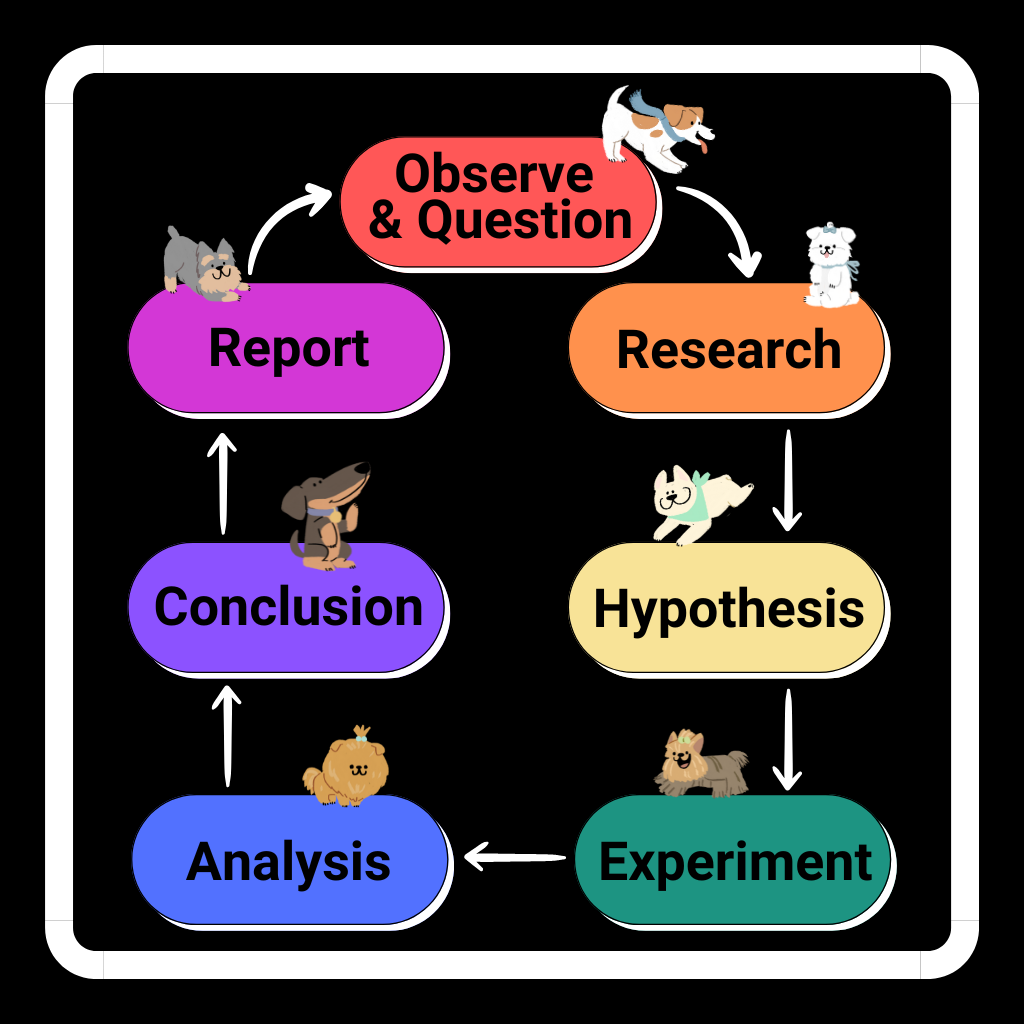
What is the engineering design process?
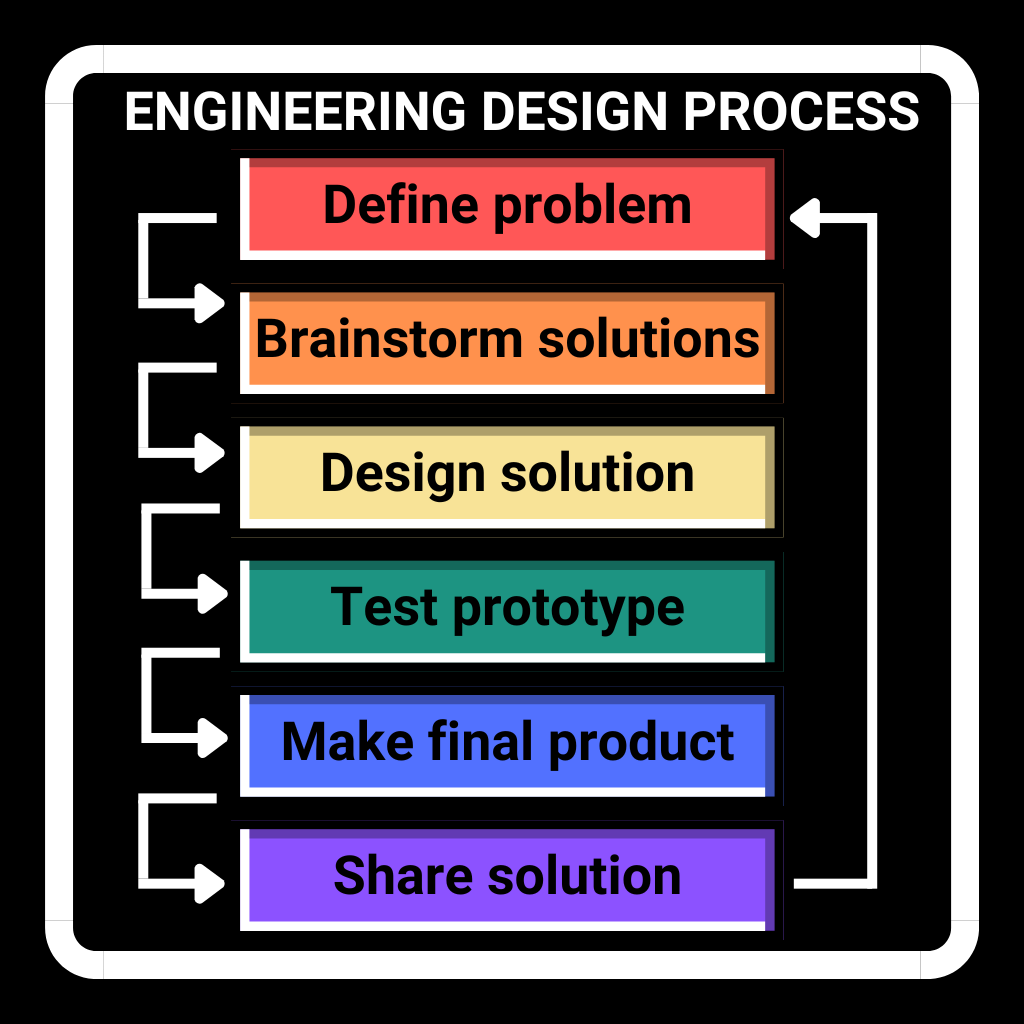
Where can I find a science fair competition?
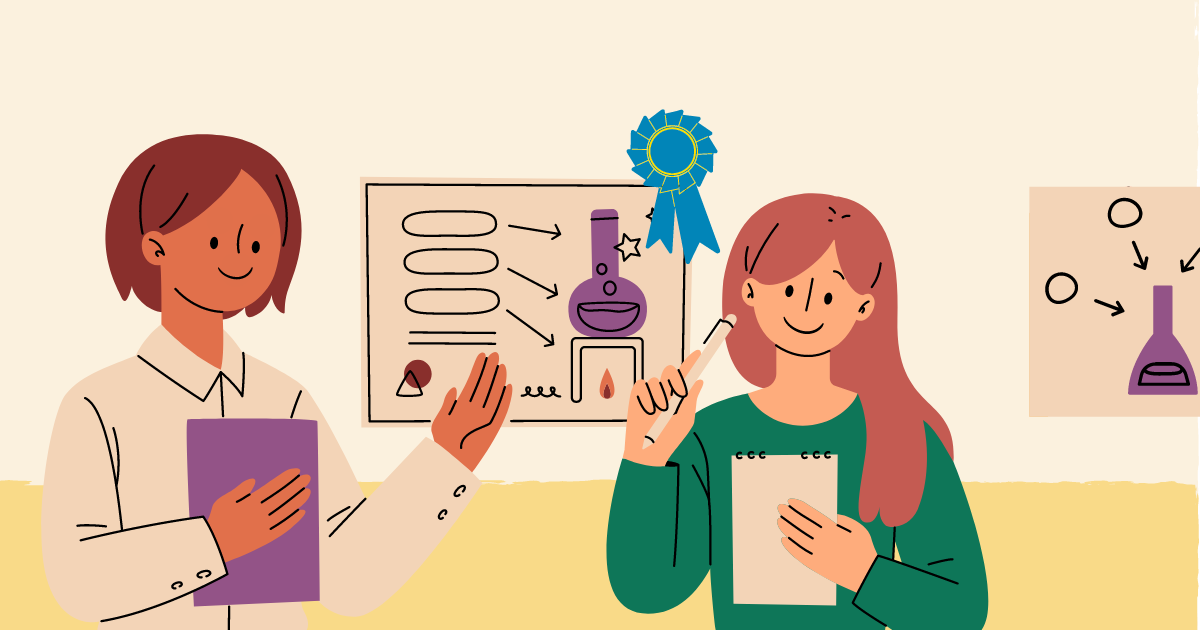
The www Virtual Library: Science Fairs website also has a collection of science fairs from all over the world, as well as national, state, regional, local, and virtual competitions!
- Skip to primary navigation
- Skip to main content
- Skip to footer
Science Struck
Stop Worrying, 7th Grades! Here are 35 Rad Science Fair Topics
Making projects for science fair topics for 7th grade is a unique way in teaching children scientific concepts that are difficult to understand. Which is why they must be fun, creative, and easy to try.
Like it? Share it!

Academics beyond textbooks and classroom walls make a better impact. Science fairs projects are one such kind of learning medium, where the toughest topics can be explained with interesting models and graphical representations. With a little help, any subject can be turned into an eye pleasing science fair project. To make science fair topics for 7th grade worth the effort, let the students pick the topics they like.
List of Science Fairs Topics for 7th Grade
- How does a magnet affect radish plant growth?
- Does temperature affect the performance of a fuel cell?
- Which building design will best withstand an earthquake?
- What techniques do air traffic controllers use to control air traffic? How efficient are these techniques?
- How does temperature affect the survival rate of aquatic plants?
- Can animals see in the dark better than humans? Explain how.
- Does shoe design really affect an athlete’s jumping height?
- What kind of fertilizers work better? Natural or synthetic?
- What light brightness makes plants grow the best?
- How much weight can the surface tension of water hold?
- Can people tell artificial smells from real ones?
- How does music affect animal and plant behavior?
- What is the best way to prevent an ice cube from melting?
- How is out heart rate affected by the food we eat?
- What are the terrible effects of acid rain?
- Can background noise levels affect how well we concentrate?
- Do antioxidants really improve a human’s life span?
- How does temperature affect the growth of yeast or mold on bread?
- Does the species of wood affect the rate at which it burns?
- How does talking on a cell phone or listening to music affect reaction time?
- Do we remember a sequence of letters and numbers better if they hear or see the sequence first?
- What is the importance of breakfast in our lives? How does it affect our metabolism rate?
- How does music influence learning and memory?
- Do daily memory-oriented activities slow memory loss at occurs with aging?
- How does caffeine and nicotine affect bacterial growth?
- What antibacterial properties do extracts from basil and mint plants have?
- What effects do garlic and vitamin C have on high blood pressure in people?
- Does the Atkins high-protein diet really work?
- How does exercise affect heart rate recovery?
- How does light affect the vitamin C content of juice?
- How effective are herbal oils and DEET as mosquito repellents?
- Can vocal wave form patterns be used to identify individuals?
- Can computer systems for recognizing human motion be used to counter terrorism?
- How does sunspot activity affect radio reception?
- How does the air temperature affect carbon monoxide emissions when a car is first started?
Participating in science fair projects encourages the child to read and learn more about myriad subjects. Getting involved in your child’s academics will not only motivate the child but also help you develop a bond of trust and reliability. However, you need to support the child and not do the project for him. Doing the entire project by yourself will make your child handicapped and defeat the whole purpose of the science fair.
The above list science fair topics for 7th grade are extremely easy to do. Ask your child to write a script to explain to the viewers what the project is all about. The simpler the script, the easier it is for him to understand and to explain it. Science fair projects help a great deal in explaining scientific concepts in a jiffy.
Get Updates Right to Your Inbox
Privacy overview.
*** Enter the $2,000 College Transitions No Essay Scholarship Contest ***
Science Fair Ideas for 7th Grade – 60 Perfect Projects
June 27, 2024

If your 7th graders are preparing for the science fair, it’s possible that you’re looking for some ideas to get them started. With these 7th grade science projects, your students will be sure to feel inspired and ready to begin. These science fair ideas for 7th grade include projects related to biology, health & psychology, environmental science, chemistry, physics, and engineering.
Things to consider – Science fair ideas for 7th grade—60 perfect projects
Each of these projects is ranked according to “difficulty” and “materials.” You can consider these rankings as you decide which to share with your 7th grade students.
Difficulty : How advanced is the project? Do your 7th graders have enough time to complete it? Each project is rated “basic,” “medium,” or “advanced” based on the complexity of the concept and the amount of time it will take.
Materials : These projects also range in terms of the complexity of the materials and setup, and are ranked as “basic,” “medium,” or “advanced.”
Biology – Science Fair Ideas for 7th Grade—60 Perfect Projects
1) extracting dna from onions.
Can DNA be studied separately from other cell components? In this experiment, students creatively use a variety of household supplies to learn more about DNA, an important biology concept.
- Difficulty: advanced
- Materials: advanced
- Learn more: onion DNA extraction
2) Grow box design
Build a grow box (or series of grow boxes) for plants using cardboard, foil, and a plug-in light source. Students can test the effectiveness of the grow box when variables are changed, such as light source strength and box size. After this experiment, your students can invite plants into their homes or the classroom all winter long.
- Difficulty: medium
- Materials: medium
- Learn more: DIY grow box
3) Collect biofilm
Biofilm is comprised of microscopic bacteria accumulating on objects in the water (you might notice it rivers, swimming pools, or even on the surface of teeth). Students can quantify biofilm by building a collector. They can also experiment with ways to reduce it.
- Learn more: biofilm experiment
Science Fair Ideas for 7th Grade – 60 Perfect Projects (Continued)
4) plants and phototropism.
Do plants really grow towards light? Discover more about how plants respond to light through this simple experiment.
- Difficulty: basic
- Learn more: phototropism
5) Nitrogen and plants
Explore the important role of nitrogen in plant growth with this science fair project. The experiment involves comparing the growth of pea plants with and without nitrogen-fixing bacteria.
- Learn more: nitrogen and pea plants
6) Bubble cell membranes
If you’re looking for a fun way to teach 7th graders about cell membranes, consider using bubbles. Through this lab, students investigate the behavior of bubbles and apply it to cell membrane characteristics.
- Learn more: cell membrane bubble lab
7) Test Darwin’s theory
With this lab, students repeat Darwin’s “survival of the fittest finch” experiment for a fun and interactive way to learn about natural selection and evolution.
- Learn more: natural selection lab
8) Carbon cycle experiment
Help your 7th graders learn about processes of photosynthesis and respiration through this project that combines biology and chemistry concepts.
- Learn more: carbon cycle experiment
9) Test for germs
What’s the dirtiest place in the kitchen? The refrigerator handle? The coffee machine? The sink? Students can guess, though it might not be what they think. Swab household items and store the samples over several days to find out.
- Learn more: germ experiment
10) Cell size lab
In this project, students can analyze surface-area-to-volume ratios using beets and bleach, demonstrating how small cells are more efficient at moving materials in and out.
- Learn more: cell size lab
Health and psychology – Science Fair Ideas for 7th Grade
11) colors and memory.
Find out how color affects memory by asking volunteers to recall simple words on differently-colored construction paper.
- Materials: basic
- Learn more: color influencing memory
12) Measuring tooth decay
Since eggshells share similar properties to teeth, your students can use them to test how different beverages erode tooth enamel. This project teaches biology concepts while also encouraging healthy eating and dental care.
- Learn more: tooth decay egg experiment
13) Cooking and Vitamin C
Do cooked fruits and vegetables have less Vitamin C than raw ones? This is another good experiment for your students interested in nutritional science. This project involves a slightly more complex procedure, so it’s also perfect for your advanced 7 th grade students.
- Learn more: Vitamin C determination
Science Fair Ideas for 7th Grade (Continued)
14) caffeine and typing.
Does a jolt of caffeine help you work more efficiently? Test this out through typing with this 7 th grade science experiment. Your 7 th grade students can run this test with mild forms of caffeine, such as soda or a piece of chocolate.
- Learn more: caffeine and typing
15) Psychology and texting language
If you teach 7 th graders, you may have heard them speaking in texting-speak. Have these texting abbreviations become a full language? With this project, your 7 th grade students can create a text-language glossary and study its practical applications.
- Learn more: is texting a new language?
16) Test calorie counts
Where does the calorie number on packaged foods come from? Try this experiment with a variety of foods to help your students understand how food energizes us.
- Learn more: test calorie counts
17) Balloon lung capacity
Using a balloon and a tape measurer, students can measure lung capacity, which has a number of health implications. It can be made more or less complicated depending on the measurements taken (circumference vs. volume of the balloon, for example).
- Learn more: measuring lung capacity
18) Myers-Briggs and memory
Are your students interested in exploring questions of psychology and memory? This experiment involves asking volunteers to take a Myers-Briggs personality test, followed by a simple memory exam. They only need internet access and willing volunteers.
- Learn more: memory and personality
19) Flexibility experiment
There are a number of reasons for stretching, including reducing chances of injury and feeling calmer. But does stretching actually make us more flexible? Find out by comparing flexibility before and after stretch exercises. Students can test volunteers after holding the stretches for different lengths of time.
- Learn more: flexibility experiment
20) Sleep and memory
Can sleep deprivation affect memory? Your students can find out by quizzing volunteers on trivia studied beforehand after 8 or 5 hours of sleep. While this project takes some planning, organization, and willing volunteers, it’s a fun way to promote healthy sleep habits.
- Learn more: sleep and memory
Environmental science – Science Fair Ideas for 7th Grade
21) water filtration.
Create a charcoal filter in order to better understand water filtration systems. Afterwards, students discuss the science behind clean drinking water, as well as its environmental implications.
- Learn more: charcoal water purifying experiment
22) Acid rain and plant life
Does acid rain negatively affect plants? Students can test this environmental concern using vinegar. Advanced students can also experiment with different pH levels for a more complex project.
- Learn more: acid rain experiment
23) Ocean acidification
For another project related to acidification, students can make stimulated ocean water and test its effects on seashells.
- Learn more: ocean acidification lab
24) Test the greenhouse effect
Though the greenhouse effect can help planet Earth to stay at a livable temperature, it also causes harmful global warming when enhanced by excess greenhouse gases. With this model, students can see the greenhouse phenomenon in action, and discuss how humans could reduce greenhouse gas emissions.
- Materials: simple
- Learn more: greenhouse effect experiment
25) Grow garbage plants
Grow plants using different kinds of compost and garbage to see which kind of matter facilitates the quickest growth. This project is a great way to teach about composting and sustainability.
- Learn more: growing plants in garbage
26) Water cycle bags
7th grade students can learn more about the water cycle with only a Ziploc bag, food coloring, water, and a marker. Once these water cycle bags are created, they can be hung by a window and checked throughout the following days. Students can observe and record a miniature water cycle happening before their eyes. For more complexity, they can check it at different temperatures.
- Learn more: water cycle bags
27) Glacier ice-cutting
For a demonstration of how glaciers melt from pressure, try this ice-cube-cutting experiment. Mix it up by timing the process with differently sized ice-cubes and weights.
- Learn more: ice cube vs. wire
28) Water quality testing
A simple water testing kit opens numerous possibilities for science fair projects, including testing the water quality of local streams, ponds, swimming pools, and drinking-water taps. If students don’t have water testing kits on hand, they can purchase them for under $30. This is a perfect way to teach about the importance of clean water sources.
- Learn more: water quality experiment
29) Algae growth
Teach students about fertilizer runoff and its harmful impacts on local waterways through this experiment, which has students test the effects of pollutants on algae growth using household fertilizers.
- Learn more: algae and pollution
30) Bird watch
Project FeederWatch is perfect for students who might take an interest in ornithology. It only involves putting a bird feeder outside and recording the number of visitors. For more complex studies, students can take on Feeder Design Challenges .
- Learn more: bird feeding with Project FeederWatch
Chemistry – Science Fair Ideas for 7th Grade
31) slime design.
Chances are, you already know that middle school students love slime. Turn the fascination into a learning activity by experimenting with chemical properties to create the best slime.
- Learn more: how to make slime
32) Mummify a hot dog
Students can understand the chemical processes involved in mummification by completing this simple experiment.
- Learn more: hot dog mummification
33) Eggshell chalk
Your 7th graders can make their own sidewalk chalk by using the calcium in eggshells. They can change variables (flour type, water temperature, etc.) to see which chalk is the most long-lasting or water-resistant.
- Learn more: make your own eggshell chalk
34) Homemade ice cream
The secret to making ice cream is to lower the freezing point of ice. The secret to this secret? Salt. With this experiment, students can have delicious vanilla ice cream ready in about 20 minutes. Test different ingredients for the creamiest results.
- Learn more: homemade ice cream
35) Saltwater and density
Explore salinity by making an egg float or sink in water with various salt levels. You can base your salt levels on notorious salty bodies of water such as the Great Salt Lake (6-27% salt water) and the Dead Sea (34% salt water).
- Learn more: egg float science experiment
36) Oxidation experiment
Ever wondered how to slow or prevent rusting? Rusting occurs through a process of oxidation, which can be slowed using different liquids. Test how saltwater, freshwater, and other liquids affect oxidation on common metal objects (paper clips, staples, coins, etc.)
- Learn more: does it rust?
37) Static water bending
Change the flow of water just by combing your hair and then holding it next to a stream of water. How far can you bend the water by combing your hair for different lengths of time? This is a great way to help 7th graders understand static electricity.
- Learn more: bending water experiment
38) Blow bubbles
Yes, bubble-blowing can be a science fair project. Ask your students to test how temperature affects bubble life through this fun experiment.
- Learn more: bubble life and temperature
39) Red cabbage pH indicator
Explore chemistry by testing the pH of liquids such as vinegar, milk, and coffee. You’ll need cups and bowls, and of course, red cabbage.
- Learn more: red cabbage indicator experiment
40) Plate coins with copper
Create copper-plated coins by extracting copper from a solution, through processes of electrolysis and electroplating . This is a fun way to combine chemistry and electrical engineering.
- Learn more: copper plated coins
Physics Projects – Science Fair Ideas for 7th Grade
41) balloon temperature.
Using this simple and visual balloon experiment, students can better understand how air expands when heated, a basic component of thermodynamics.
- Learn more: balloon temperature experiment
42) Floating tea bags
To teach your students about heat and its effects on air molecules, give them this tea bag experiment. Since this project involves fire, you should make sure your students have adult supervision while conducting the experiment. It’s also great for a class demonstration.
- Learn more: floating tea bags
43) Build a parachute
7th graders can learn about speed, velocity, and acceleration by crafting their own parachutes. They can use different bag materials to test for a smooth fall and graceful landing.
- Learn more: build a parachute
44) Solar-powered oven
Teach your students about thermal energy, reflection, and convection through this fun project. Test the oven on a warm sunny day for delicious results (s’mores).
- Learn more: build a solar oven
45) Swing a glass of water
This is a great way for 7th graders to learn about centripetal force. The goal is to swing glasses of water over their heads without spilling the water (we recommend doing this experiment outside since it has the potential to get messy).
- Learn more: centripetal force experiment
46) Instant ice
Through this experiment, your students can experiment with instant ice. For variations, try leaving the water in the freezer for different times, or using other liquids.
- Learn more: instant ice experiment
47) Rainbow density tower
Teach about density using this simple project with a beautiful outcome. Once students have created their density towers, they can test the density of other objects ty tossing them in (how far will a coin sink? A peanut? An egg?)
- Learn more: density tower
48) Separate hot and cold water
For another density-related experiment, try separating water by temperature. Students can run the test with the hotter (less density) on the bottom and colder (more density) on the top, and then vice versa.
- Learn more: separating hot and cold water
49) Physics of sound
It turns out that sound has physical matter. Students can demonstrate this by blowing out a candle using only sound vibrations, which move through an oatmeal box.
- Learn more: discovering sound matters
50) Graphite circuit
For another electricity-focused experiment, challenge your students to create an electrical circuit using pencil graphite. Since it involves drawing, students can put their art skills to use for a beautiful result.
- Learn more: graphite circuit
Engineering Projects – Science Fair Ideas for 7th Grade
51) pet auto-feeder.
For a more advanced project with practical application, have your students build this automatic pet feeder. Some coding is involved, which could interest your computer-engineering-oriented students.
- Learn more: auto-feed your pet from anywhere
52) Balloon-powered car
To help your students learn about engineering design and kinetic energy, suggest that they build a balloon car out of materials likely found around their homes. They can experiment with different wheel and balloon sizes to see how fast the car can go.
- Learn more: Newton’s balloon car
53) Build a geodesic dome
A geodesic dome is a thin-shell structure created out of triangular elements, which help it to withstand heavy loads. This experiment utilizes geometry concepts and it only requires paper and masking tape (students can play with different types of paper and tape as variables).
- Learn more: geodesic dome
54) Da Vinci’s bridge
This bridge-building project is inspired by Leonardo da Vinci’s self-supporting wooden bridge. Your students will only need pencils and rubber bands (not to tie the pencils together, but to make sure they don’t slip). Test the bridge with different objects to see how much weight it can take.
- Learn more: Da Vinci’s bridge
55) Tensegrity structure
Understand the mechanics of tension by making this functional floating structure that’s mind-boggling to look at. You will need string, popsicle sticks, and some patience for exact measurements.
- Learn more: anti-gravity structure
56) Make a water clock
In this engineering project (which has been around since ancient times), students can create a clock from plastic cups, a small bell, yarn, and several other common craft items.
- Learn more: water clock
57) Design a pinball machine
Your 7th grade students can create functioning parts for a homemade pinball machine using objects found at home or in the classroom. They can test for speed and materials as they craft their own game.
- Learn more: homemade pinball
58) Rubber band helicopter
Students can learn about helicopter mechanics by constructing this flying and rubber-band-powered toy.
- Learn more: rubber band helicopter
59) Crash cars
This experiment involves building cars and then crash-testing them with raw eggs inside as “passengers.” What structures best protect the egg? Beware: this one could get messy.
- Learn more: car crash project
60) Build an electricity generator
For another electrical engineering project, students can create an electric generator. Challenge them to test the generator using different materials for different results.
- Learn more: energy generator
Final thoughts – Science Fair Ideas for 7th Grade
Hopefully your 7 th grade students will find projects to get excited about from this list. For more classroom resources applicable to middle school students, we recommend the following articles:
- 124 Good Icebreaker Questions for Students/Adults
- 141 Fun, Weird, & Interesting Facts
- 102 Fun Last Day of School Activities
- 56 8 th Grade Science Fair Projects
- 100 Best Quotes About Education & Teachers
- 150 Journal Prompts for Kids, Middle & High School Students
- 151 Best Summer Jobs for Teachers
- Teacher Tools

Sarah Mininsohn
With a BA from Wesleyan University and an MFA from the University of Illinois at Urbana-Champaign, Sarah is a writer, educator, and artist. She served as a graduate instructor at the University of Illinois, a tutor at St Peter’s School in Philadelphia, and an academic writing tutor and thesis mentor at Wesleyan’s Writing Workshop.
- 2-Year Colleges
- ADHD/LD/Autism/Executive Functioning
- Application Strategies
- Best Colleges by Major
- Best Colleges by State
- Big Picture
- Career & Personality Assessment
- College Essay
- College Search/Knowledge
- College Success
- Costs & Financial Aid
- Data Visualizations
- Dental School Admissions
- Extracurricular Activities
- General Knowledge
- Graduate School Admissions
- High School Success
- High Schools
- Homeschool Resources
- Law School Admissions
- Medical School Admissions
- Middle School Success
- Navigating the Admissions Process
- Online Learning
- Outdoor Adventure
- Private High School Spotlight
- Research Programs
- Summer Program Spotlight
- Summer Programs
- Test Prep Provider Spotlight

“Innovative and invaluable…use this book as your college lifeline.”
— Lynn O'Shaughnessy
Nationally Recognized College Expert

$2,000 No Essay Scholarship
Presented by College Transitions
- Win $2,000 for college • 1 minute or less to enter • No essay required • Open to students and parents in the U.S.
Create your account today and easily enter all future sweepstakes!
Enter to Win $2,000 Today!

IMAGES
COMMENTS
Students can choose to follow the science experiment as written or put their own spin on the project. For a personalized list of science projects, seventh graders can use the Science Buddies Topic Selection Wizard. The wizard asks students to respond to a series of simple statements and then uses their answers to recommend age-appropriate ...
Jan 25, 2024 · Whatever your approach, we have the best science fair ideas for 7th grade. Use this list for science fair ideas for biology and environmental science, chemistry, physics, or engineering. We’ve organized the science fair ideas to help students figure out which project is right for them. Level of difficulty: Easy: Allows students to engage in a ...
Why Science Projects Matter in 7th Grade. Here are the reasons why science projects matter in 7th grade: Encourages Curiosity: Science projects help 7th graders explore new ideas. Teaches Problem-Solving: Students learn how to find answers by testing ideas. Develops Critical Thinking: Students think about why things happen in their experiments.
What are some easy 7th grade science fair projects? Each of these science fair projects are easy for seventh grade science students do. Explore how glow-in-the-dark sticks work, discover how far apart planets really are, and make your own geode crystal with borax! Chocolate Asphalt. Making Lightning in a Pan. Glow Sticks: Temperature Effects
Science fairs projects are one such kind of learning medium, where the toughest topics can be explained with interesting models and graphical representations. With a little help, any subject can be turned into an eye pleasing science fair project. To make science fair topics for 7th grade worth the effort, let the students pick the topics they ...
Jun 27, 2024 · With these 7th grade science projects, your students will be sure to feel inspired and ready to begin. These science fair ideas for 7th grade include projects related to biology, health & psychology, environmental science, chemistry, physics, and engineering. Things to consider – Science fair ideas for 7th grade—60 perfect projects